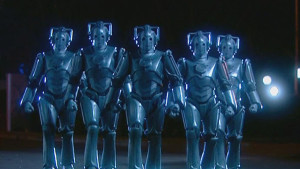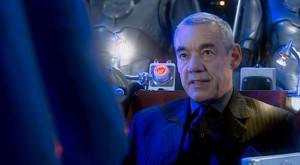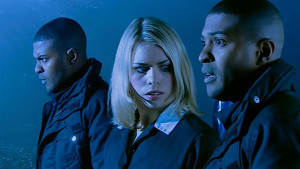 It is a basic element of humanity that we have the freedom to make our own choices—good or bad. In the Christian worldview, this was very intentional on the part of the Creator. Although most humans would consider choice a good and inalienable right, it is clear that this “gift” can sometimes be a curse. Just watch the evening news or go on YouTube for 5 minutes: humans are just as likely to make the most wrong choice as they are the right one. Together, these episodes of Who simply, if not effectively, explore this dilemma: should humans be allowed to have free will, if they are going to use it to hurt one another and themselves?
It is a basic element of humanity that we have the freedom to make our own choices—good or bad. In the Christian worldview, this was very intentional on the part of the Creator. Although most humans would consider choice a good and inalienable right, it is clear that this “gift” can sometimes be a curse. Just watch the evening news or go on YouTube for 5 minutes: humans are just as likely to make the most wrong choice as they are the right one. Together, these episodes of Who simply, if not effectively, explore this dilemma: should humans be allowed to have free will, if they are going to use it to hurt one another and themselves?
To flesh it out, we have a dichotomy of opinions represented: On one hand, we have genius and entrepreneur Mr. Lumic, who is bent on taking humanity into a new era of evolution by discarding its “flaws”—i.e.: all emotional capability. On the other hand, we have familiar heroes fighting for the preservation of humanity as it is. This leads to a very literal fight between automatons and humans, and for the first time in the show’s reboot, we are introduced to the old Who villain the Cybermen.
 Mr. Lumic is a sick old man who creates the Cybermen for the sake of his own preservation. But this soon goes beyond him—he becomes obsessed with this “gift” of “new life” to the world, and begins to force this new stage of evolution upon humanity. A Cyberman is essentially a human brain stripped of emotion and placed in a metal body. From his point of view, Lumic is the savior of the world, offering it purity, greatness, and immortality. But the transformation process costs humans their essence, their ability to feel and to choose—ultimately, their soul.
Mr. Lumic is a sick old man who creates the Cybermen for the sake of his own preservation. But this soon goes beyond him—he becomes obsessed with this “gift” of “new life” to the world, and begins to force this new stage of evolution upon humanity. A Cyberman is essentially a human brain stripped of emotion and placed in a metal body. From his point of view, Lumic is the savior of the world, offering it purity, greatness, and immortality. But the transformation process costs humans their essence, their ability to feel and to choose—ultimately, their soul.
Mr. Lumic: “I will bring peace to the world. Everlasting peace. And unity, and uniformity.”
The Doctor: “And imagination, what about that? The one thing that led you here: imagination. You’re killing it dead!”
Mr. Lumic: “What is your name?”
The Doctor: “I’m the Doctor.”
Mr. Lumic: “A redundant title. Doctors need not exist. Cybermen never sicken.”
The Doctor: “Yeah, but that’s it! That’s exactly the point. Oh, Lumic, you’re a clever men. I’d call you a genius, except I’m in the room. But everything you’ve invented, you did to fight your sickness. And that’s brilliant—that is so human! But once you get rid of sickness and mortality, then what’s there to strive for? Eh? The Cybermen won’t advance. You’ll just stop! You’ll stay like this forever! A metal earth with metal men and metal thoughts. Lacking the one thing that makes this planet so alive: people! Ordinary, stupid, brilliant people!”
Mr. Lumic: “You are proud of your emotions?”
The Doctor: “Oh yes.”
Mr. Lumic: “Then tell me, Doctor, have you known grief? And rage? And pain?”
The Doctor: “Yes, yes I have.”
Mr. Lumic: “And they hurt?”
The Doctor: “Oh yes.”
Mr. Lumic: “I can set you free. Would you not want that? A life without pain?”
The Doctor: “You might as well kill me.”
When God created man, he had this same choice. Program man to follow him and be unquestionably influenced by His will, or allow man to make his own choices, good and bad? Why was he willing to take the risks of the latter? I can put it no better than C.S. Lewis in The Case for Christianity.
[quote]“God created things which had free will. That means creatures which can go wrong or right. Some people think they can imagine a creature which was free but had no possibility of going wrong, but I can’t. If a thing is free to be good it’s also free to be bad. And free will is what has made evil possible. Why, then, did God give them free will? Because free will, though it makes evil possible, is also the only thing that makes possible any love or goodness or joy worth having. A world of automata -of creatures that worked like machines- would hardly be worth creating. The happiness which God designs for His higher creatures is the happiness of being freely, voluntarily united to Him and to each other in an ecstasy of love and delight compared with which the most rapturous love between a man and a woman on this earth is mere milk and water. And for that they’ve got to be free.” -C.S. Lewis, The Case for Christianity[/quote]
One of the most satisfying things about this two-part story is its focus on Mickey. It’s about time, too! He has his flaws and weaknesses, but he wants to be more. In these episodes, Mickey indeed gets a chance to become something greater. He and the Doctor and Rose get stuck in a parallel world where there are two Mickey Smiths–except one is named Ricky. They have much the same personality, but Ricky is tough and willing to put himself on the front line to defend his city and the people in it. Through the person of Ricky, Mickey comes face-to-face with what he could be if he chose to overcome his fears and jealousy and put others before himself.
 It is moving to watch Mickey dig deeply into himself and draw out the courage and intelligence that has been dormant. He is able to do this because he takes on a new focus, pouring his life out for others instead of living a small life bent on preserving itself. His transformation is inspiring, but it’s important to note that while ordinary people can change the world for the better by making good choices, we are not capable of eliminating our tendency towards bad choices. The danger and pain of personal choice is obvious in our world. When we see the dark and hurtful choices of our fellow man, perhaps Mr. Lumic’s perspective seems a little less crazy. But what is the alternative to the gift of choice? Through the Cybermen, Lumic is creating slaves out of humanity. In taking away the ability to feel anger or hatred or jealousy or greed, he also takes away the ability to feel love and compassion and kindness and selflessness.
It is moving to watch Mickey dig deeply into himself and draw out the courage and intelligence that has been dormant. He is able to do this because he takes on a new focus, pouring his life out for others instead of living a small life bent on preserving itself. His transformation is inspiring, but it’s important to note that while ordinary people can change the world for the better by making good choices, we are not capable of eliminating our tendency towards bad choices. The danger and pain of personal choice is obvious in our world. When we see the dark and hurtful choices of our fellow man, perhaps Mr. Lumic’s perspective seems a little less crazy. But what is the alternative to the gift of choice? Through the Cybermen, Lumic is creating slaves out of humanity. In taking away the ability to feel anger or hatred or jealousy or greed, he also takes away the ability to feel love and compassion and kindness and selflessness.
There is a kind of “slavery” offered to humanity that is full of individuality and life: a chosen servitude to a worthy master. In this arrangement, we don’t have to be afraid to exercise our free will because God rejoices in our successes and has endless grace for our failures, often transforming us into something more beautiful as we struggle through our flaws.
[quote]”Of course God knew what would happen if they used their freedom the wrong way: apparently, He thought it worth the risk. (…) If God thinks this state of war in the universe a price worth paying for free will -that is, for making a real world in which creatures can do real good or harm and something of real importance can happen, instead of a toy world which only moves when He pulls the strings- then we may take it it is worth paying.” -C.S. Lewis, The Case for Christianity[/quote]


